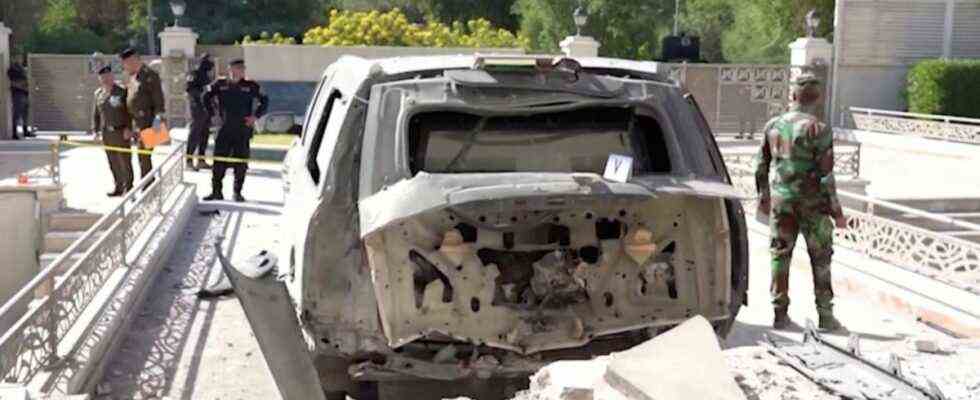For the expert, the pictures of the scene of the attack, the residence of the Iraqi prime minister, clearly delimit the group of perpetrators. “The components found in the drones used and their payloads are almost identical to similar components from the attack on the US embassy in July 2021,” says drone specialist Markus Reisner. These weapons have been used repeatedly against US forces in Iraq for months, according to the Austrian. So they are a new standard weapon of pro-Iranian militias.
A total of three drones with dump charges were steered into the prime minister’s house early on Sunday morning. Two could be intercepted. A third blew open a door of the residence, dropped concrete parts from the ceiling and destroyed a parked car. Seven guards were injured.
Mustafa al-Kadhimi appeared in a televised address a few hours after the attack. “Cowardly rocket and drone attacks do not build a home or a future,” he said, apparently wearing a bandage on his left wrist. Large sections of the political class in Baghdad are upset after the murder attack.
There has been no attack on an incumbent prime minister since Saddam Hussein was overthrown in 2003. “The peaceful transfer of power has been a valuable asset in Iraq ever since,” says Middle East expert Daniel Gerlach, head of an international commission of experts at the National Dialogue. This discussion format brings representatives of civil society and politicians together. The next round was actually planned for the end of this month in the Iraqi capital.
After the drone attack, tanks hit Baghdad and helicopters circled over the green zone near the attack site. At the same time, supporters of Shiite militias held out in their neighboring protest camp. They had opened this after the parliamentary elections on November 10th in order to have the votes counted again.
Electricity is more important to Iraqis than the fight against IS
The polls, which according to international observers were exemplary, ended in a heavy defeat for the Fatah coalition, which is close to Iran. In the 2018 election, with 48 seats, they were the second strongest force, but now they only achieved 14. For two main reasons: On the one hand, they had failed tactically because their candidates won each other’s votes in many newly designed electoral districts.
On the other hand, the focus of the Iraqis had changed: the “Islamic State”, against which the so-called “people’s mobilization units”, the Hashd al-Shaabi, related to Iran, had fought, is no longer classified by many as an existential threat. “Rather, people now primarily want services such as electricity in the summer, which is sometimes over 50 degrees Celsius,” says Iraq expert Inna Rudolf from King’s College in London.
During the election campaign, the Shiite preacher Moqtada al-Sadr presented himself with great success as a fighter against corruption independent of Iran and counteracted his image as an Islamist warlord. In doing so, he also took account of the national protest movement in autumn 2019. Two years ago, thousands of young Iraqis took to the streets against the nepotism of the rulers. Al-Sadr’s movement now won 73 seats in the election, a relative majority. The Shiite leader urges the formation of a majority government without Fatah participation. The former head of the secret service, Mustafa al-Kadhimi, could remain head of government as an independent technocrat.
After the attack, Prime Minister Mustafa al-Kadhimi presented himself with the leaders of the Iraqi security forces.
(Photo: REUTERS)
After the attack, the prime minister was assured of extensive support from the region, Europe and the USA. As a survivor of a targeted killing attempt, he has gained political capital. For many, he is considered a hero. There are three possible scenarios: Al-Kadhimi remains in office with the support of al-Sadr’s supporters, a member of the Sadrists himself becomes head of government, or there is a consensus candidate who will bring the camps together without the Sadrists. For the latter, according to Daniel Gerlach, ex-prime minister Nuri al-Maliki, who is allegedly playing a constructive role as the initiator of talks in Baghdad these days, could be an option. “He’s just about to reinvent himself,” says Gerlach.
The militias want their share of power
The Hashd al-Shaabi should not simply accept their threatened marginalization. After all, the allocation of posts and ministries is also about money and supplying the militia, for example by integrating their combat units into the national security forces. The question now is how far they could go to achieve their goals, especially after the shock of the attack. On Friday there had already been serious riots near the Green Zone, in which the state security forces shot at least two militiamen. A few hours before the drone attack, a party and militia leader publicly threatened the prime minister: “The blood of the martyrs will judge you.”
According to Inna Rudolf from King’s College, the Hashd al-Shaabi are threatening to gamble away their positive image among many Iraqis: “They were set up as the saviors of the state in the fight against IS in 2014. If they would now position themselves against the institutions of the state, undermine them that is their founding narrative and thus their credibility. “

